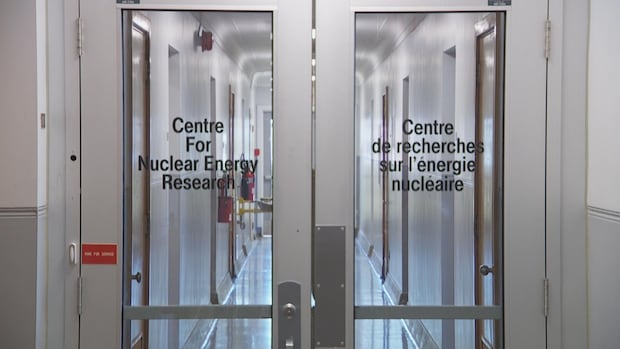A University of New Brunswick professor says nuclear energy will be needed to meet the province’s growing demand in the coming decades, and a full nuclear engineering degree program at the institution could ease the way.
“When we start building new generating assets, and [are] trying to keep the current-generation capacity that we have operating, we need new workers to come in,” said William Cook, the director of UNB’s Centre for Nuclear Energy Research.
The university’s new nuclear lab could be a key part of such a program.
The Advanced Nuclear Reactors Laboratory — now a month into its operation — has been in the works for eight years on UNB’s Fredericton campus. The space is filled with equipment graduate students and scientists working in the field use to measure how materials interact in environments simulating those in nuclear reactors.
William Cook, the director of UNB’s Centre for Nuclear Energy Research, says the province needs a full nuclear engineer degree program to meet its future energy demands.
Cook and his team supervise the work, aimed at understanding some of the degradation mechanisms that can happen in reactors, primarily corrosion. The goal is to identify what can cause systems to fail over time, and work to prevent such failures.
“For the past five or six years, since small modular reactors have become a very hot topic, we’ve been gearing up our activities to help support [them, and] the advanced reactor sector as well,” Cook said.
“That’s what this laboratory is really all about — to be able to support Generation IV reactor systems.”
Program needed to bring in new workers
Cook said the university currently has roughly eight to 10 nuclear engineering course offerings as options students can take while working toward a chemical or mechanical engineering degree. He wants to see a full nuclear engineering program at the university, to meet the workforce needs he is sure will be there.

New Brunswick is one of only two Canadian provinces with nuclear reactors, the other being Ontario. The average age of a nuclear worker in Canada is currently 55.
Cook cited the long-standing relationships the UNB centre has with nuclear industry players, including those at New Brunswick’s Point Lepreau Nuclear Generating Station, in saying the time is right “to expand our opportunities.”
One big reason: New Brunswick’s need for electricity is expected to double over the coming decades. He believes more nuclear power generation will be needed, along with a new generation of workers.
For a full degree nuclear engineering program to materialize, the University of New Brunswick would need experts and professors to teach new courses and support the research and development. It would also need UNB’s upper administration to be on board.
The provincial government has shown a lot of interest in nuclear projects lately.
Nuclear expansion could come in the form of a potential second power plant at Point Lepreau.
The provincial and federal governments have also invested in two New Brunswick companies to build small modular reactors at the Point Lepreau site by 2030. However, both Moltex and ARC Clean Energy are running into challenges that suggest that timeline is not expected to be met.
Moltex Energy Canada says trouble at its U.K. parent company has slowed its work on small modular reactors, or SMRs.
Meanwhile, New Brunswick’s pitch for a “nation-building project” in response to a call from Prime Minister Mark Carney involves the province becoming a key part of a plan called the Eastern Energy Partnership.
Premier Susan Holt has said the province is leveraging the “expertise at the University of New Brunswick and others to figure out ways” to make the province a part of Canada’s “energy super power.”
“The capabilities now that we have with the new and existing labs allow us to support all sorts of different reactor technologies as we go about these nation-building projects,” Cook said.

The executive director of the Atlantic Centre for Energy, Michelle Robichaud, said she would love to see a full nuclear engineering program at the university, given the industry’s potential to play into other fields like cyber security and green manufacturing.
“It’s all those other components that are going to be really important as we evolve and transition towards a cleaner energy future,” she said.
Nuclear expansion draws fire too
But nuclear energy has its critics. The province’s Green Party leader, David Coon, has previously criticized the province’s aims for nuclear expansion and questions the idea of the province being a leader in the sector.
He believes universities should be exploring all kinds of research without constraint — and criticizes the connections to industry that the university and its nuclear research centre have developed.
“The university decided years ago to branch out and to host institutions that are providing consulting services to industry. And you have to wonder, is that a good fit for our universities?” Coon said.
Responding to that, Cook said university professors are typically “world-leading experts in their fields” whose guidance is very useful to governments and industry alike.
“While we have a mandate to teach in the classroom, our research activities provide extensive training for students and we leverage our expertise to consult and advise with industry,” he said.
There’s also the thorny issue of what to do with spent nuclear fuel, which must be stored in safe and secure systems for many decades after use.
“Advanced nuclear reactors and the Generation IV systems actually have capability to shorten the timeline that the spent fuel needs to be stored by actively utilizing the energy content in the long-lived products,” Cook said.
“So some of the studies that we have done here, we’ll look at optimizing ways… to utilize that energy content.”







